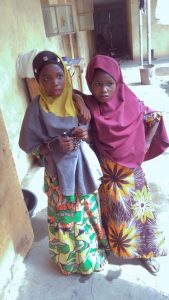By Alqosim Gbemisola

At just 10, Fatimah Muhammad is among ‘Yarinya’ girls at Usmanu Danfodiyo University Sokoto campus, doing ‘Aiki’—Hausa for menial jobs in female hostels.
Hailing from Wurno local government in Sokoto State, Northwest Nigeria, Fatimah’s journey diverges from her peers as she embarks on ‘Aiki’ duties instead of stepping into a primary school classroom.
This early departure from formal education has cast shadows of deprivation—stirring a blend of poignant reflections.
The custom she grew up with only stamped vigor on Islamic education and self-striving.
Fatimah makes it her routine to strive and survive by all means, being the first child of her mother and the enormous family she hails from. Most parental responsibilities are left to her shoulders.
Due to her indigent background, western education is a no-go means to attain. She could only attend Islamic education because of the high stance and respect placed on Islamic education (islamiyah).
“I am only allowed to attend Islamic education from 8:00 am to 10: a.m. So, me working for students earns me a tangible amount daily, which I do not get from home,” she said with a grim expression.
The deprivation dampened her interest in education and she resorted to the arduous life of being a ‘Yarinya’ girl without condemnation from her family.
Educational Deprivation in Nigeria
In Nigeria, the rate at which young girls are deprived of the entitlement to education is alarming. More than 50% of girls are not attending school at the basic education level. The picture is even bleaker in the Northern part of the country with a net attendance rate of 53 percent.
According to the United Nations International Emergency Funds (UNICEF), In Nigeria, about 10.5 million children are not in school even though primary education is officially free and compulsory.
Meanwhile, Fatimah is not the only ‘Yarinya’ girl to be trapped in the sack of educational deprivation.
Life has been different for Maryam Ahmad, the 12-year-old girl staying with her uncle in Gida Yaro, Wurno Local Government of Sokoto State. Her stay is just like an alien taking shelter under her uncle’s roof, she gets all her basic needs from ‘Aiki’ without disturbing her uncle for money. She sees the work as a depleting burden on her uncle’s part.
The satisfaction she accrues from doing work for students gives her all the necessities, availing her no time to glimpse of going to school.
“By working for students, I can get the necessities I need. Whenever we have a wedding ceremony, I use the money to buy (Anko) wedding attire without asking my uncle,” said Maryam.
Her vibe for education is not Surged, she is the type to highly social activities, and she prefers engaging in a social lifestyle to getting an education.
Sequel of this, many factors contribute to these exhibitions ranging from religious factors, customs and background factors, and economic factors.
More Tales
However, not all the victims of education deprivation have the enthusiasm for getting education, some are predisposed with no fondness for education.
In the case of Hawawu Bello, the third child of her parents who is not sure of her age, revealed her preference for working to earn money rather than to get a quality education. She sees the deprivation as an opportunity to explore her own life without being compelled or monitored by anyone.
Hawawu expressed her love for the chores she does and her gain from the work.
“ I sometimes use the daily money for myself and sometimes give it to my mother for saving.”
“And I love what I do instead of sitting at home not gaining any or even having a charge of the environment,” she revealed.”
Nusayba Aliyu, 10, would love to attend school and be like the female students she is working for in the hostel but she wasn’t given the opportunity.
Being the third child in the family of seven, Nusayba accepted the hindrance of education she is aligned to. The money she accrued from doing ‘Aiki’ has blocked her dreams of education and she indulged herself more to it.
“Most of the time I make a total of ₦300, ₦200, or even ₦500 from the Aiki’ and in most cases, I’ll be given food in place of money for the work I do,” she expressed.
The impediment of becoming a student like other students deterred her but having no power, she succumbed. Her profound education was only an illumination to her.
“I would love to attend school if I have the opportunity to attend any, I would love to learn and come as a student I do Aiki for some days,” she said optimistically.
